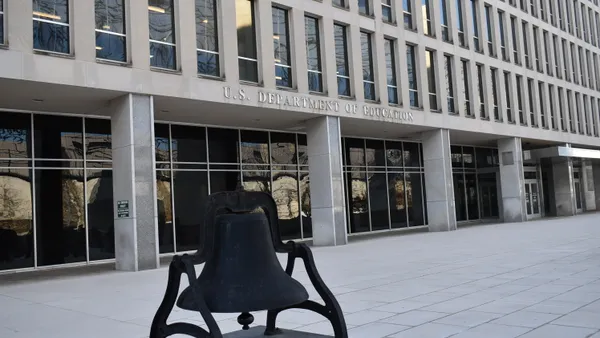Dive Brief:
- Michigan State University was fined a record $4.5 million and is required to make several changes to how it approaches campus safety and Title IX reporting, U.S. Education Department officials told reporters on a call Thursday.
- The requirements are the result of investigations by the department's office of Federal Student Aid and its Office for Civil Rights, respectively, into the university's Clery Act compliance and its handling of complaints of sexual abuse by former sports doctor Larry Nassar.
- Michigan State Provost June Youatt resigned following the investigation, the Detroit Free Press reported, noting that the department's report was critical of how she handled complaints about inappropriate sexual remarks by Nassar's boss, William Strampel. He has since been sentenced for misconduct in office and willful neglect of duty.
Dive Insight:
The news comes just over two months after Michigan State launched its own investigation into how its officials handled the complaints, following reports it was stonewalling a probe by the state's attorney general’s office.
By not adequately responding to the complaints, the university "subjected students to a sexually hostile environment that denied them access to the ability to benefit from their education," said Education Secretary Betsy DeVos, on the call. "Too many people in power knew about the behaviors and the complaints and yet the predators continued on the payroll and abused even more students."
Some 500 women and girls have come forward to say that Larry Nassar sexually abused them.
The department based its fine on four findings of noncompliance under the Clery Act:
- That the university did not properly classify reported incidents and disclose crime statistics.
- That it did not issue timely warnings required by federal regulations.
- That it did not identify and notify campus security authorities and establish an adequate system for collecting crime statistics.
- And that it lacks the administrative capability to fulfill its related obligations.
Specific to the complaints against Nassar and Strampel, the investigation found the university did not respond adequately to allegations of sexual misconduct. It also found the university did not take appropriate measures to protect students who filed complaints while they were being processed, or to prevent further harassment.
In addition to the fine, which is the largest yet under the Clery Act, the university must make several changes to comply with the law and address Title IX violations. Those include hiring an independent Clery compliance officer and establishing a compliance committee of cross-campus stakeholders.
The university must also provide a means for individuals to come forward and seek remedy against Nassar if they have not yet done so. It must also enhance training, consider additional student services and review the actions of current and former employees who may have failed to take appropriate action to reports of sexual misconduct by Nassar or Strampel.
In a statement posted on its website Thursday, Michigan State indicated it has begun making those changes, including the creation of an oversight committee.
In June, Michigan State announced it hired a law firm to conduct a review of how it handled the allegations against Nassar, though the process has drawn criticism for a potential lack of objectivity. The university has said the results of the inquiry will be made public, contrary to the findings of an internal investigation in 2016 that were never released.
Meanwhile, the university is moving forward. In May, it announced former Stony Brook University President Samuel Stanley Jr. as its new president, replacing two interim leaders and ex-President Lou Anna Simon, who stepped down due to criticism of how the university handled the situation. She now faces criminal charges.
Stanley has made hearing from Nassar's victims a priority in helping the university improve its policies protecting students. "We never want to see a repeat of it, but we don't want to forget it," he said. "I think what I'm really interested in doing is learning from what happened, understanding what went wrong," he told the Lansing State Journal.
The university has established a $500 million settlement fund for Nassar's victims














